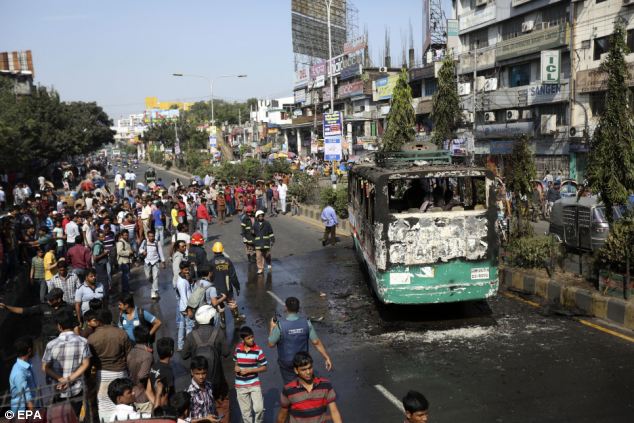Unidentified attackers threw petrol bombs on a packed passenger bus, leaving at least seven people dead and 16 others injured early Tuesday amid a nationwide general strike enforced by an opposition alliance calling for new elections in Bangladesh.
Local police chief Uttam Chakrabarty said the pre-dawn attack took place in the eastern district of Comilla when passengers were asleep on a trip to Dhaka from the southern coastal district of Cox’s Bazar. The area is about 90 kilometers (55 miles) east of the capital. The injured have been hospitalized mostly for burns, he said.
It is the latest in a series of arson attacks allegedly carried out by opposition activists that have killed at least 53 people have died since Jan. 5 as the opposition alliance led by former Prime Minister Khaleda Zia enforces a nationwide transportation blockade called to force Prime Minister Sheikh Hasina to step down.
The Jan. 5 was the one-year anniversary of Hasina’s return to power. Zia had planned an anti-government rally in Dhaka on that day, but police refused to allow it due to violence worries. Zia then announced a nonstop transportation blockade until Hasina resigns.
But many buses, often escorted by police and para-military border guards, have been running, sparking attacks around the country. Authorities blame opposition activists and hired goons for the attacks. Zia and her aides say the opposition is not involved.
Tuesday was also the last day of a 72-hour nationwide general strike enforced by the opposition. Zia’s party and its partners – who had demanded that a neutral administration oversee the election – boycotted the last vote in 2014, allowing Hasina to win a five-year term. Hasina says new elections will not be held until her term ends in 2019, saying the nation cannot suffer because of a “wrong political decision.”
The new phase of violence ended a year of relative calm as political violence left nearly 300 people dead in 2013. Zia was prime minister from 2001 to 2006, but failed to hand over power peacefully. A military-backed caretaker government then ruled the country for two years before Hasina came to power with a landslide election win in 2008. SAPA






 WhatsApp us
WhatsApp us 

